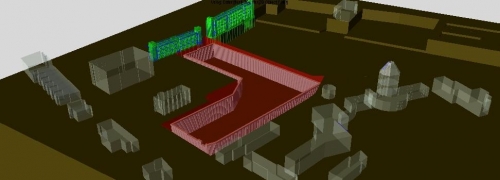
Ongoing Works
 Piling Rigs:-The piling activities are now largely installed with drilling operations continuing for only one more week.
Piling Rigs:-The piling activities are now largely installed with drilling operations continuing for only one more week.
Secant Piles:- There is a total of 532 secant piles bored to a depth in excess of 20m to form a continuous concrete pile wall around the perimeter of the double storey basement. There are two types of secant pile: a female pile formed from a weaker concrete mix and a male pile that is reinforced with steel and provides the strength in the wall. Secant is a mathematical term and comes from the Latin secare (to cut). The male pile cuts into the female pile providing a continuous sealed basement wall.
Pile Cropping:- It is necessary to cut down the top of the piles to expose the reinforcement cage to tie into the capping beam and also remove any debris that sometimes contaminates the top of the pile when extracting the auger. This activity is carried out using a specialist cropping attachment for the excavator and trimmed using breakers. We are currently 50% through this activity and expect to complete towards the end of October.
Capping Beam:- A concrete capping beam is being constructed along the top of the piles to connect them and form a solid continuous ring beam. This operation has commenced near the Woodstock Road and will continue to the beginning of November.
Future works for October
 Steel Propping:- Large steel props are expected to be secured into position on w/c 10-10-11 using a crane. These will brace at ground level along the capping beam in order to restrain the ground pressure from the surrounding sides of the building once digging commences.
Steel Propping:- Large steel props are expected to be secured into position on w/c 10-10-11 using a crane. These will brace at ground level along the capping beam in order to restrain the ground pressure from the surrounding sides of the building once digging commences.
The Big Dig:- Excavation of the soil within the footprint of the building is expected to start in mid October. There will be over 47,000m3 of soil to be removed. The gravel will be recycled and the clay used locally as fill material. As the excavation proceeds the props and capping beam will be closely monitored to ensure there is no movement.
Images from Site Tour on 14/10/2011
| [bg|new-building/site-visits/20111014] |





 Piling Rigs:-The piling activities are now largely installed with drilling operations continuing for only one more week.
Piling Rigs:-The piling activities are now largely installed with drilling operations continuing for only one more week.  Steel Propping:- Large steel props are expected to be secured into position on w/c 10-10-11 using a crane. These will brace at ground level along the capping beam in order to restrain the ground pressure from the surrounding sides of the building once digging commences.
Steel Propping:- Large steel props are expected to be secured into position on w/c 10-10-11 using a crane. These will brace at ground level along the capping beam in order to restrain the ground pressure from the surrounding sides of the building once digging commences.